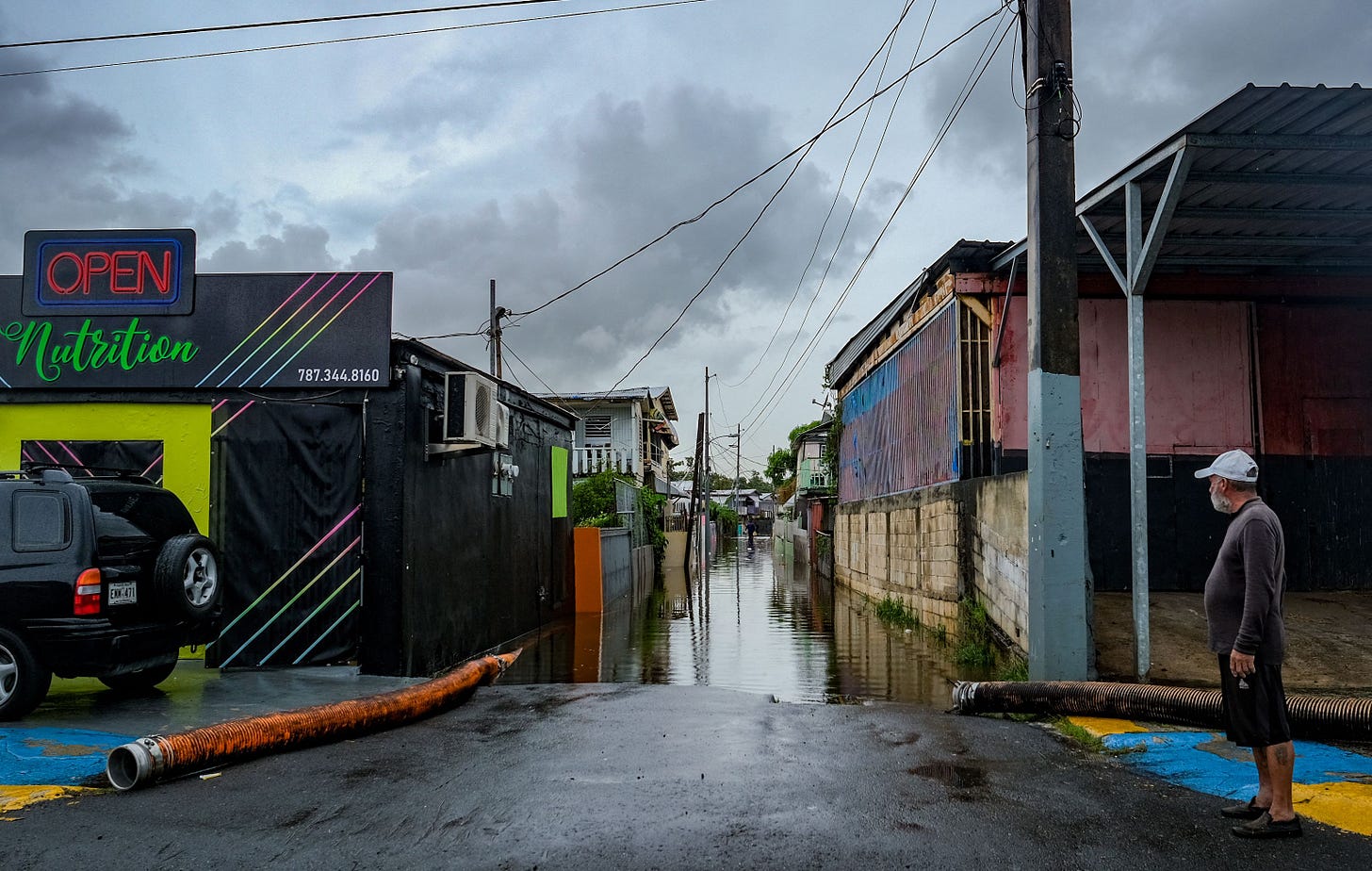This Is What Colonialism Looks Like
Hurricane Fiona shows that Puerto Rico is still an American colony, 124 years later.

On Wednesday, the United States government, in all of its glory, made a benevolent decision: it decided to allow the people of Puerto Rico to have fuel.
The Biden administration moved Wednesday to allow a non-U.S. flagged ship to transport fuel to Puerto Rico, following pressure to waive a rule in the face of a diesel shortage after Hurricane Fiona.
The decision to make came in “response to urgent and immediate needs of the Puerto Rican people in the aftermath of Hurricane Fiona ... to ensure that the people of Puerto Rican have sufficient diesel to run generators needed for electricity and the functioning critical facilities,” Department of Homeland Security Secretary Alejandro Mayorkas said in a statement Wednesday.
This special dispensation from the Biden administration was required because of the Jones Act, a century-old law that mandates that ships carrying goods between American ports must be American-made, American-owned, and staffed by American crews. The law ostensibly applies to the entirety of the U.S., but it disproportionately chokes the economies of island territories like Puerto Rico and Hawaii. Unlike Hawaiians, however, Puerto Ricans cannot elect senators or representatives who could vote to overturn the Jones Act. They can’t choose a president to do it either, and their rights in U.S. courts are limited by the fact that the Supreme Court has repeatedly ruled, including very recently, that they are functionally second-class citizens.
So Puerto Ricans are reduced to the equivalent of begging in times of crisis, and, when the U.S. government deigns to smile beneficently upon them, to express thanks.
There is a word for a territory that cannot control its own fate in this way, whose citizens lack full democratic representation and are powerless against the whims of their political overlords. That word is “colony,” and, no matter what terminology the U.S. uses to describe its relationship with Puerto Rico, it is, undoubtedly, an American colony.
Puerto Rico was an American colony from the moment the U.S. seized the island from Spain in 1898, and the following 124 years have done nothing to change that fact. The misery that Puerto Ricans are suffering through in the wake of Hurricane Fiona—which, like Hurricane Maria five years ago, devastated the island—is the latest in an endlessly long line of colonial indignities. Puerto Ricans are American citizens, but in the past decade alone, American legislators imposed brutal and flagrantly undemocratic austerity measures on Puerto Rico through a so-called “board” that controls its finances and has more power than its elected government. The Supreme Court signed off on this plan, and also ruled that Puerto Rico has no legal authority to restructure its own debt. Just this year, the court decided that Congress has the right to block Puerto Ricans from receiving some benefits which American citizens living in the 50 states are entitled to. This continued an over 100-year tradition of Supreme Court decisions that upheld Puerto Rico’s colonial status. (The latest ruling, by the way, went the way the Biden administration wanted it to. Puerto Rican colonialism is a bipartisan affair.)
When American thinkpiece types talk about this, they often lump Puerto Rico together with Washington, DC, and say that Congress needs to grant statehood to both territories. But DC, even though its people live under undemocratic strictures, is not an American colony, and the history of its relationship with the federal government is completely different than Puerto Rico’s. Puerto Rico was seized as an explicitly imperialist prize in wartime. It has a deeply-rooted independence movement and a long history of armed struggle against American authority.
This is not a situation where American powers should step in and decide one more time what happens to Puerto Ricans. It’s a situation that requires Puerto Ricans to be able to fully exercise their right to self-determination, without intervention from the empire next door, and choose their own future for themselves. (Full disclosure: I have close family ties to the Puerto Rican independence movement, so no prizes for guessing what I think should happen.) Until then, its colonial status will endure, and will shame the United States.





Can anyone educate me regarding the reason we care about Puerto Rico? Like, why do we still maintain control of it? Is it a military thing? Rich person vacation spot? I'm genuinely confused and curious about this.
Good piece, Jack. I assume you've read 'How to Hide an Empire' but if not I found it fairly illuminating as a person who has only rudimentary education on the U.S.'s grim subjugation, neglect, and malice of colonial Puerto Rico. If you haven't, I recommend it, may be a little surface-level for you on PR but connected a lot of dots for me between PR, the Philippines, Northern Marianas, Alaska, etc.